Parliament was prorogued on Thursday 28 April. The State Opening of Parliament will take place on 10 May and the Queen’s Speech will set the agenda for the forthcoming Parliament.
Research
Tech transfer: The Government has announced that Dr Alison Campbell OBE has been hired as CEO of the new Government Office for Tech Transfer which will support the Government to manages and commercialise its (estimated) £104bn worth of knowledgeable assets. Dr Campbell was previously the Director of Knowledge Transfer in Ireland’s national office helping businesses to benefit from access to public sector research expertise and technology. She started her career in the biotech industry and previous positions include interim CEO of the Medical Research Council’s technology transfer company (MRCT), and leading technology transfer and research support at King’s College London.
Technology transfer is the broad term applied to the transfer of assets, such as intellectual property rights, technology or new knowledge, from one organisation to another, with the aim of stimulating the development and adoption of new products, processes and services that benefit society.
The new government unit will sit within BEIS and is being developed to ensure that the public sector is maximising the value of its knowledge and innovation assets including intellectual property, software, processes and data. The unit will launch later in 2022 to provide specialist skills to support the way government manages its knowledge assets.
R&D Expenditure: The Office for National Statistics (ONS) published the latest figures on R&D and related expenditure by UK government departments, UKRI and HE funding bodies in 2020. Main points:
- The UK government’s net expenditure R&D reached a new high of £15.3 billion in 2020. An increase since 2019 of £1.7 billion (in current prices), representing the largest percentage increase in current or constant prices since 2013.
- Total net expenditure on R&D and knowledge transfer activities reached £15.5 billion in 2020 and represented 0.7% of gross domestic product (GDP), which was in-line with the long-term trend of 0.6% to 0.7% since 2009.
- UKRI contributed the most to net expenditure on R&D and knowledge transfer activities in 2020, at £6.1 billion, 40% of the total.
- In constant prices (adjusted for inflation), civil net expenditure on R&D and knowledge transfer activities (excluding EU R&D budget contributions) increased by 28.9% over the long term, from £10.2 billion in 2009 to £13.2 billion in 2020.
- Defence R&D expenditure was £1.1 billion in 2020 compared with £1.0 billion (in current prices) in 2019; a 4.8% increase.
- UK contributions to EU R&D expenditure decreased to £1.3 billion in 2020, down from the peak of £1.4 billion (in current prices) in 2019.
Quick News
- ECRs: The British Academy announced the third (and final) hub of the Early-Career Researcher (ECR) Network – a two-year pilot programme for UK-based postdoctoral researchers in the humanities and social sciences. It will be in Scotland and co-led by the universities of Stirling and Glasgow. The pilot ECR hubs will run until March 2023 and aim to establish an inclusive, UK-wide Network for ECRs in the humanities and social sciences, providing opportunities for skills development and networking across the whole country. The hubs previously launched are located in the Midlands and South West of England. Researchers join the ECR Network via the British Academy’s Registration Form . All humanities and social sciences researchers who identify as early career are eligible to join, regardless of their funding source or background. This includes those working outside of academia, in independent research organisations and other policy or third sector institutions, and those not in employment but with relevant links into Scotland, the Midlands and South West research communities.
- Innovation Fellowships: The British Academy has unveiledthe projects that have received funding as part of the BEIS funded Innovation Fellowships (Route A: Researcher-led) scheme. The funding will facilitate projects which encourage collaboration between researchers, organisations, and business. (Wonkhe)
- Horizon Europe deadline: Research Profession reports that UK researchers awarded some Horizon Europe grants have been given two months to move their projects to a European Union institution or risk having their funding cut. Full details are here. In response UKRI stated: We sympathise with researchers who receive this message from the European Research Council, but can reassure them that the Horizon Europe guarantee funding provided by BEIS via UKRI will allow them to receive the full value of their funding and continue their research in the UK. Awardees do not need to move abroad to an EU Member State or to an Associated Country to Horizon Europe to access this funding. There is detailed guidance on our website at ukri.org/HorizonEU. However, Caroline Rusterholz (Cambridge University) highlighted that even if UKRI steps in, the prestige of the ERC grant will be lost. The Guardian has coverage.
- Student Engagement: Wonkhe – The Office for Students (OfS) and Research England have publishedinterim evaluation reports from projects funded by the Student Engagement in Knowledge Exchange challenge competition. The evaluation finds that student engagement improved students’ skills, strengthened students’ networks, increased students’ employability, and strengthened relationships between higher education providers and partner organisations and businesses. They also found that effective engagement required a mix of in-person and online attendance to enhance accessibility, pre-event briefings to minimise poor attendance, and regular and accessible communications to maintain momentum and student interest.
Parliamentary Questions:
Question: Ensuring UK educational institutions avoid relationships with non-UK organisations that (a) hold or (b) host items taken from Ukrainian territory.
Answer: Michelle Donelan – I…have recently written to the higher education sector to outline our expectation that universities review their partnerships with Russia and take appropriate action…This includes taking action on research partnerships as well as asking universities to review their broader investments arrangements… I am continuing to ask that all universities conduct due diligence when entering into all international partnerships and accepting foreign investment, in line with Universities UK guidance on ‘Managing risks in Internationalisation’.
Lifelong learning
UUK have published their response: University leaders support much-needed flexible learning revolution (universitiesuk.ac.uk)
Our response has five key messages:
- Universities are ready and willing to deliver on the LLE ambition
- The new system must appeal to potential learners of all ages and have wide course eligibility
- We need a greater understanding of the level of demand for modular study
- Information, advice and guidance will be at the heart of the LLE
- We should use existing regulatory and quality mechanisms to avoid new overly complex regulation
Full response is here: Our response to the Department for Education (DfE) consultation on the lifelong loan entitlement (LLE) (universitiesuk.ac.uk)
On the first point, which is a big deal:
- The study of modules should allow progression to full qualifications, with exit points at levels 4, 5 and 6. Many higher education institutions will adapt how they deliver modular study to meet learner needs, such as changing study timetables. They will also give tailored wrap-around support and advice on progression routes. Higher education institutions can build on existing best practice and partnerships to collaborate to support transfer and credit recognition.
- ….we recognise that the design and length of some courses may mean some are more appropriately funded per-academic year. We think that providers are best placed to decide this as they respond to learner and employer demand.
- …The cost of modular delivery will exceed that of full-time provision for providers. This is partly due to the additional administration required. We also know individuals re-entering formal study may require additional academic and study skills support upon entry. This includes wrap around support such as careers guidance, counselling, and access to facilities
- …High-cost courses and modules would need further support. For example those that use labs or specialist equipment. Therefore, deriving a fee from the qualification may not completely compensate where the take up of particular modules is more prevalent than others. A high level of unpredictability initially about learner demand for short courses could impact the cross-subsidy model that higher education providers operate. There is a risk that providers are disincentivised from offering expensive courses. We think these challenges could be mitigated through the strategic priorities grant, over developing models for differential fees
- .. A learner’s previous assessment and module marks are not normally carried over at the point of transfer and institutions typically rely on marks received post-transfer. Some institutions require a certain percentage of a student’s learning to be completed in a single institution at level 6 to calculate the final classification. The regulation around the LLE will have to consider the implications of different practice across the sector when calculating classifications and assessing student outcomes and how these can be mitigated or managed.
And this:
- The OfS should consult and review on the appropriateness of student outcome measures for learners studying under the LLE.
- The non-completion measure would need revising and/or a clause added to accommodate modular learning. Leaving a provider without completing a full degree cannot in itself be regarded as an indicator of failure, either for the student or the institution, but particularly not in the case where a ‘step on step off’ approach is proactively encouraged. Employment and further study outcomes would also need to be reconsidered to account for non-linear work and flexible study patterns of learners, and/or the possibility that individuals already in ‘professional jobs’ are reskilling or up-skilling.
They raise an interesting concern about placement years: It is unclear from the proposals how the funding for sandwich programmes would work. This must be considered to avoid any unintended consequences for the learners. We believe that sandwich years should be funded and not draw from elements of the loan entitlement. Placement years attract a fee but at a lower rate reflecting that students are mostly with their employer but do receive support from academics and professional staff and can use facilities. Depending on the design of the LLE there is a risk that students who choose a 4 year degree may use up all their entitlement in one go, and that students who come to year 1 having studied a foundation year would be disincentivised from choosing a 4 year degree with placement to progress onto. We do not believe the DfE intends to restrict sandwiches years – after all these courses support graduates to be work ready and meet employer needs – but this needs clarifying.
The rest of this is worth reading too – but let’s not underestimate how huge a change this would be across the sector.
Student Loans
The Lords have expressed concerns over the lack of information on the impact of changes to student loans legislation. The Regulations have been laid by the Department for Education (DfE) and make changes which mean the current repayment thresholds for student loans that applied in the 2021-22 financial year will be maintained and continue to apply in the 2022-23 financial year. This avoids an automatic 4.6% increase of these thresholds on 6 April 2022. However, the Lords are concerned about the impact on those who have student loans. The Secondary Legislation Scrutiny Committee (36th report) highlights that while DfE made it clear…that the changes made by this instrument will generate an expected £3.7 billion of savings in public sector net borrowing… [to] 2024-25, it is silent on any additional costs those with student loans might incur as a result of these changes.
Lord Hutton of Furness, Member of the Secondary Legislation Scrutiny Committee said: In this instance, we are particularly concerned that while these changes will affect a large portion of the student population and possibly their families, the EM only emphasises the savings Government will make and is silent on the costs to those who have student loans. This is unsatisfactory and the House may wish to raise this omission with the Minister.
There are also several student loan related parliamentary questions:
Access & Participation
APPs: Wonkhe report on John Blake’s (OfS Director Fair Access and Participation) request that variations 2023/24 access and participation plans be submitted by 31 July. The variations need to address new key priorities – making APPs more understandable and accessible to students and key stakeholders, partnering with local schools, and creating more routes into higher education through expanding degree apprenticeships and flexible level 4 and 5 qualifications. But given where inflation is at and the wider cost of living crisis, Jim Dickinson argues on Wonk Corner that revisions may well also need to consider student financial support.
Parliamentary Question: National scholarship scheme – Government are currently considering the design of the scheme and to set a roll out date after this – As part of the higher education reform consultation, we welcome views on how the eligibility for a national scholarship scheme should be set to support students and address ongoing financial barriers that can restrict high achieving, disadvantaged students from achieving their full academic potential whilst studying in higher education.
Degree classification – what, where & grade impact on earnings
The Institute for Fiscal Studies (IFS), commissioned by the DfE, published Higher degree classes are associated with substantially higher earnings examining the financial benefits associated with different degree classifications. After controlling for student characteristics, higher degree classes are associated with substantially higher earnings. Degree class seems to matter most for those attending the most selective universities and studying subjects where future earnings are highest. Suggesting that access to ‘elite jobs’ is governed by what you study, where you study and how well you do at university.
- The average premium for gaining a first class degree over an upper second (2.1) is 4% for women and 7% for men.
- The penalty for getting a lower second (2.2) as opposed to a 2.1 is 7% lower earnings for women and 11% lower earnings for men.
- Obtaining a lower class (below 2.2) degree is associated with 15% lower earnings for women and 18% lower earnings for men, again compared with a 2.1.
Main findings from the report:
- The share of university students obtaining different degree classes varies substantially by subject studied and institution attended. Among the 2012–2015 cohorts of graduates, around 20% obtained first class degrees; just over half received upper second class degrees; around 20% received lower second degrees; and around 5% received lower class degrees. Subjects involving maths have a more even spread of awards across degree classes than other subjects. More selective universities tend to award higher class degrees.
- There has been a long-term trend towards higher degree classes awarded in all subjects and at all levels of university selectivity, which accelerated around the 2010 graduation year. The share of people getting first class degrees more than trebled between the 1999 and 2015 graduating cohorts. Meanwhile, the share of 2.1s remained fairly flat; the biggest declines were in the share of people getting 2.2s.
- Earnings differences between those graduating with different degree classes are large. Five years after graduation, median annual pre-tax earnings for both women and men who obtained a lower second class degree in 2013 were around £3,800 lower than for those who received an upper second class degree (or around 15% lower for women and around 13% for men). Women who obtained first class degrees earned around £2,200 (8%) more than women with upper second class degrees, and men with first class degrees earned £4,100 (14%) more than men who obtained upper second class degrees.
- Payoffs for a higher degree class vary hugely by subject. For some subjects, degree class matters a lot for earnings, while for others it does not matter at all. For men and women studying law or economics, getting a lower second class degree rather than an upper second is associated with more than 15% lower earnings, whereas there is no significant difference for those studying education or English. Subjects with high labour market returns tend to have high degree class premiums and subjects with low labour market returns tend to have low degree class premiums. This suggests that even students of high-return subjects typically need to get at least a 2.1 in order to access highly paid jobs (except medicine, a high-return subject which does not usually award degree classifications).
- Achieving at least a 2.1 has a much bigger payoff at more selective universities. Controlling for observable characteristics, both men and women who obtain a lower second class degree from the most selective universities earn 20% less on average at age 30 than those who achieve an upper second class degree, compared with around 6% for women and 8% for men who got lower second class degrees from the least selective universities.
- There are stark gender differences in the payoff to achieving a first class degree at a very selective university. At the most selective universities (Oxford, Cambridge, Imperial College London and the London School of Economics), the average payoff to a first class degree versus a 2.1 is near zero for women, but very large at around 14% for men.
- Despite substantial increases in the average grades of graduates during the period there are no large changes in degree class premiums over time. Median graduate earnings five years after graduation fell by more than £5,000 between the 2002 and 2009 graduation cohorts in all degree classes for both women and men. Yet earnings gaps between degree classes have been constant throughout the period. This is consistent both with improvements in overall student attainment and with lower academic standards.
Ben Waltmann, Senior Research Economist at IFS and a co-author of the report, said: The findings imply that degree classification may matter as much as university attended for later life earnings. Other things equal, going to a more selective university is good for future earnings, and the fact that few students from disadvantaged backgrounds attend the most selective universities is a barrier to social mobility. But that being said, many graduates who get a 2.2 from a highly selective university might have got a higher-paying job had they attended a slightly less selective university and got a 2.1. Prospective students, parents and policymakers should take note.
More HE, more graduates, more jobs?
UUK have weighed in on the topic publishing Busting graduate job myths. They tackle four ‘myths’:
That everyone goes to university nowadays
This delves into technical data a little stating that using a more nuanced and accurate measure no cohort examined has reached a participation rate in higher education of 50%. Although 40% do and, over time, it looks likely that there will be a cohort of young people of which the majority will go through higher education or an equivalent of some kind. Which includes vocational and technical routes:
- Even if half of the 18-year-olds from 2021 achieve a higher education qualification, many will do so later in life, or take unconventional and diverse routes.
- Many critics of the current system suggest that it would be better for more people to achieve qualifications through routes other than the ‘conventional’ pathway of taking a traditional bachelor’s degree at university directly from school. The data shows that it would take only a small change in the way it is reported to show that this is already happening.
There aren’t enough graduate jobs
- It’s hard to tell how many graduate jobs there are or how many graduates are in graduate jobs, in part because it depends on how you measure what a graduate job is.
- There have been fewer graduate jobs during periods of high unemployment, such as during recessions. Institute of Student Employers (ISE) data shows that the number of graduate vacancies is now 20% higher than in 2019 before the Covid-19 pandemic. Job vacancies for graduates are expected to increase by more than a fifth (22%) in 2022 compared to 2021.
- Data shows that most graduates are in jobs for which a degree is an appropriate qualification… There is little clear evidence that there existed a period in the past when the graduate labour market was considerably stronger.
- The ONS Annual Population Survey estimates that there were 15,053,100 people with degree or equivalent qualifications working in the UK at the end of 2020. By looking at the data from the OfS’ graduate employment metrics in the same time period we see that in the UK in 2020 there were 15,978,200 employees in SOC categories 1 to 3.
The gap is almost a million jobs. Graduate supply still does not meet demand.
- The number of jobs for which graduates are suitable compared to the number of graduates seem reasonably well matched. There are both shortages of graduates in some fields, and obvious areas of graduate underemployment in others. The UK is not unusual in any of these respects.
- It’s crucial to remember that longitudinal studies of graduates show that just because a certain proportion of graduates do not secure graduate-level work early in their career, does not mean that this proportion of graduates will never get a good job. In fact, most of those early underemployed graduates will not be underemployed for the rest of their careers.
- How many graduates have a graduate job? The honest answer is that nobody knows. It looks to be a comfortable majority, but that depends on how you define what a graduate job is
Some degrees have little value to employers
- If the data shows that the number of graduates and the number of graduate jobs available seem well-matched, why do we have underemployed graduates and skills shortages elsewhere?
- Almost twice the percentage of the UK workforce are underqualified for their role than overqualified for their role. This might be due to low investment in adult skills training in the UK.
- The labour market and jobs themselves are also constantly changing. At least a quarter of new graduates do jobs that did not exist 50 years ago. Many non-graduates may be in graduate jobs because the jobs themselves have changed over time. The below chart – Figure 4 – shows the change in graduate market entry in the last 50 years.
- In the UK, your degree subject matters less. Many employers are looking for well-rounded graduates with transferable skills, rather than specific degree subjects
All the best graduate jobs are in London
UUK suggest graduates are less mobile than actually believed with many choosing to work in places where they already have a connection. Only 20% work in an area where they do not already have a connection. Those than return home to their home area are the most likely to be in non-graduate jobs. Pages 23-24 (listed as pages 20-21 on the document) has a chart and further analysis explaining this. UUK conclude that the link to place (and therefore the levelling up agenda) is crucial: The levelling up agenda will need to take into account that graduates will tend to stay linked to places they know. A local university makes it much easier to attract and retain graduate talent.
- Looking to the future UUK predict that Artificial intelligence (AI) is set to increase graduate demand further with healthcare, IT and marketing expected to see particularly steep rises.
More HE: The Tony Blair Institute for Global Change published We Don’t Need No Education? The Case for Expanding Higher Education arguing that the UK needs more graduates to counter a slowdown in growth and productivity over the past decade. Prior to publication Tony Blair pushed one of the report’s main recommendations – that the UK should aim to raise HE participation to 60% by 2030, and to 70% by 2040.
The research outlined in the report demonstrates how the expansion of HE over the past generation has become a progressively more important source of prosperity and the mainstay of economic growth since the global financial crisis. The analysis also suggests that if seven in ten young people completed HE, this would significantly raise the rate of productivity growth and boost the size of the economy by almost 5% over the next generation compared to allowing educational attainment to stagnate.
Former (Conservative) universities minister Lord (Jo) Johnson argues in the report’s foreword that the country needs more skills and that the skills we need are defined by future flexibility, rather than current employment needs. Jo Johnson:
- the popular notion that “too many go to university” is rooted in the view that we churn out more graduates than befits our economy, and that public money is wasted on low-value courses.
- As this paper acknowledges, we do need to tidy up some of the rough edges that lead to poor outcomes in some instances, and there are lower-level skills gaps in our economy that do not require higher education. But neither of these mean that we have reached “peak grad”.
- The first reason is that we still don’t have enough highly skilled individuals to fill many vacancies today, for instance in professional occupations.
- The second reason – and this is arguably the report’s most important message – is that we cannot just think about skills demand in a static way; we must also plan for a future economy that will look very different to the one we currently occupy
- High-innovation economies, like South Korea, Japan and Canada, understand this and have boosted higher education; participation rates in these countries are already between 60 per cent and 70 per cent. We cannot afford for policy to remain steeped solely in today’s challenges, and our ambition should be to join them.
The report recommends:
- Aim to raise participation in HE at levels 4 and aboveto 60% by the end of this decade and 70% by 2040
- The goal would need to be paired with the policies and resources to improve school and pupil attainment
- Non-traditional routes into HEwould also need to be improved
- The government would also need to monitor the effect of recent moves to recalibrate student-loan repaymentsto ensure more debt-averse candidates have not been inadvertently discouraged from pursuing HE
- There is more to be done to make entry into HE an attractive decision to students from lower-income backgrounds, including reintroducing maintenance grants
Batting for the Government, Universities Minister Michelle Donelan, responded in the Times criticising New Labour’s previous 50% target, and the new 70% figure proposed by Blair last week, as a “one-size-fits-all” approach and “condescending”. Adding that we should hear “a little less from Tony Blair, and a little more from Euan Blair” (Tony’s son who set up an apprenticeship-focused tech firm). The Blair Vs Donelan stance is perhaps not as polarised as it might seem. Higher level technical skills are a key part of the Government’s agenda. It remains to be seen whether HEIs delivery quality higher technical learning will be welcomed and whether the HE numbers reduction is really about the cost to the Treasury.
Wonkhe have a blog – The Tony Blair Institute for Global Change makes a case for (even) more graduates, while the Institute for Fiscal Studies argues there may be a graduate oversupply. David Kernohan tries to pull it all together
Freedom of Speech
There was notable criticism of the lack of progress on the HE Freedom of Speech Bill from Shadow Education Minister Matt Western:
- What a palaver! This is less a carry-over motion and more of a carry on, if I may say so—”Carry On Regardless” being probably the most apt title…it is 358 days since the Bill was introduced to the House. Announced in the last Queen’s Speech, the Second Reading was debated nine months ago and the Public Bill Committee concluded its work over seven months ago. Since then, nothing—so is there a problem? The lack of urgency suggests it is really not that important after all. Certainly, the Secretary of State has not mentioned it once in the Chamber since his appointment five months ago, and the legislation would certainly have no effect on cancel culture, according to lawyers, media commentators and the sector itself. The Government now want another year to resolve their own problem—a problem of their making—which is more time that could be better used to address the immediate and pressing issues faced by the great British public…
FE & HE Minister Michelle Donelan responded:
- Let me be crystal clear: the Government remain committed to delivering on our manifesto pledge by strengthening freedom of speech in higher education. We have not changed, and never will change, our position, because we recognise that free speech is the absolute cornerstone of democracy and a liberal society. Our universities should be centres of inquiry and intellectual debate, and places of new and independent thinking from which will grow the knowledge, learning and science that we need to tackle future global challenges. The reintroduction of the Higher Education (Freedom of Speech) Bill reaffirms our manifesto commitment…
Research Professional also discuss the continuation of the HE Freedom of Speech Bill. Questioning why the Government is continuing with it given the isolated incidents and limited evidence there is actually a free speech problem within HE. They also highlight that a
- Ministry of Justice consultation on a Modern Bill of Rights for the UK—which features its own specific reference to protecting free speech and academic freedom—concluded last week. Potentially, the legislation it trails could subsume the higher education-specific proposals.
Research Professional also state:
- For Donelan, passing the bill is probably as much about advancement within Johnson’s Conservative Party as it is about reform of university culture. Frankly, we doubt that Donelan really believes very strongly in this nonsense.
- …The bill as written survives and may yet make it to legislation. There is, however, a journey to be undertaken—and it seems unlikely that the House of Lords will take kindly to proposed legislation that is specific in its targets but vague in its actions.
Michelle Donelan spoke on free speech at a Policy Exchange event. On the free speech ‘problem’ within HE Donelan said:
- sadly, where once we found critical debate and arguments were won on their merits, today we see an upsurge in physical threats and complete intolerance of opposing ideas.
- We witness examples of professors being harangued and hounded out of their jobs. We see prominent, well-respected, guests no platformed. We find academics self-censoring themselves out of fear.
- Progress is no longer considered progress unless it conforms to an increasingly narrow ideology. And let’s be honest for a moment, successive governments have not put up enough of a fight. There has been a lot of talk and warm words, but not nearly enough solid action.
- I am here today to tell you that this government is different. We are putting pen to paper in legislative action to once and for all challenge the forces that shut debate down… I will make sure each of our universities remains a fortress of ideas, putting an end to the nonsense of cancel culture by wielding the crucial majority that the British people gave us [i.e. Donelan suspects the Lords will oppose the Bill but intends to push it through using a 3 line whip in the House of Commons].
On the Bill Donelan said:
- The Bill will put a duty on universities to promote free speech and academic freedom, not just protect it. It will put a duty directly on Students’ Unions to protect free speech.
- And it will establish a new Director for Freedom of Speech and Academic Freedom on the Office for Students Board – with the power to fine universities, colleges and students’ unions and recommend real redress for those who have had their speech unlawfully restricted. And it will provide a new legal tort as a critical backstop, offering a direct route to redress for individuals who have suffered loss due to a breach of the freedom of speech duties.
- … We need to effect a culture change that will reverberate through the sector, from the SU bar right up to the Vice Chancellor’s office. And let me be clear, this is not an issue for Vice Chancellors to shy away from. Frankly, this is not an issue that they will be allowed to shy away from.
Skills – attracting international investment
Following on from Dr Campbell’s appointment to head up Tech Transfer a new report from World Skills UK Wanted: skills for inward investors warns that the UK needs an investment strategy with skills at its heart to not miss out on foreign investment. It finds that if the UK fails to recognise the importance of technical and vocational skills it will be left behind as other countries reap the rewards of lucrative foreign direct investment (FDI). Key points:
- The UK has been overtaken by France as Europe’s top destination for foreign investment. It argues that the UK needs a better integrated strategy on skills and inward investment to attract international firms to more parts of the UK.
- The UK currently does not have an investment strategy and the Department for International Trade needs to develop one with skills and regional opportunities at its heart.
- Almost half (46 percent) of foreign firms said they would move their operations abroad if they couldn’t get the skills they needed, compared to just over a fifth (22 percent) of domestic firms.
- When asked about expanding their operations 61 percent of foreign firms said they would expand overseas if they couldn’t get the skills they needed in the UK, compared to just a third (32 percent) of domestic firms.
- The UK’s FDI is too concentrated in the already economically dominant areas of London and the South East. It argues that delivering FDI to more parts of the UK is vital in creating the higher-skilled and better-paid jobs needed to drive the government’s levelling up agenda.
- A post-Brexit vision of Global Britain needs to showcase the UK’s excellence in skills. It says WorldSkills UK should use its unique knowledge of world-class skills to work with more parts of the UK’s technical education sector to improve skills levels right across the UK.
Skills Taskforce for Global Britain Chair John Cridland CBE says: The countries successfully bringing in foreign investment have a sophisticated skills offer to attract investors. Put bluntly, if you want to attract investment you need high-quality skills, and if you want high-quality skills you need inward investment. We need the Department for International Trade to develop a coherent investment strategy that will deliver FDI throughout the UK and not just in London and the South East. Competition is becoming fiercer and the UK simply cannot afford to miss the opportunity to add skills to its international calling card. If the Government’s levelling up agenda is to be realised, the UK has to develop and promote the skills that will deliver a high-skill, high-wage economy and attract foreign investors.
Also on skills Wonkhe report that the DfE published new strategic guidance for the Institute for Apprenticeships and Technical Education for the 2022-23 financial year. One of the central aims of the strategy is to involve the institute in forecasting what skills will be needed in the future and working with the government as part of the new Unit of Future Skills. The strategy also calls on the institute to have oversight over the quality of T levels, contribute to economic recovery, and to improve the quality of apprenticeship assessments.
Parliamentary Questions
Other news
Spiking: The House of Commons Home Affairs Committee has published a report on spiking. 81% of spiking victims were noted as students. We have a short summary of the report – contact us if you wish to read it. Wonkhe also have two blogs:
Prevent: Policy Exchange has published a report on the prevent counter terrorism strategy. Dods summarise: The report argues that Prevent has been undermined by anti-Prevent narratives and misinformation that has been spread by “Islamist groups” and allies. The groups named include the Muslim Council of Britain, Muslim Engagement and Development and CAGE. Policy Exchange accuses these groups of running disinformation campaigns to undermine Prevent, with university campuses being a key arena in which anti-Prevent activism has been particularly vocal.
UK Shared Prosperity Fund: The Department for Levelling Up, Housing and Communities announced the allocations of the UK Shared Prosperity Fund (UKSPF) amounting to £2.6bn of funding in total between 2022 and 2025. The government says the UKSPF matches the average spend from the European Social Fund and European Regional Development Fund, replacing the pots after the UK’s withdrawal from the EU. It will be increased from £400m in 2022/23 to £1.5bn in 2024/25, at which point the government says it will match the EU funds it has replaced. England has been allocated £1.58bn. Each English Local Enterprise Partnership (LEP) area will receive the same in real terms as it used to under EU funding, and within each LEP area an index of need will be used to allocated funding to each local authority. In addition to the funds allocated to nations, £129m of the UKSPF funding will be used for Multiply – the new UK-wide digital platform for adult numeracy. The DfE has also provided links to trailblazers’ Local Skills Improvement Plans (LSIPs) here.
And there is a Parliamentary Question on the topic: How will the Shared Prosperity Fund maintain Research and Innovation funding at a level matching funding available through the European Regional Development Fund? Answer – the UKSPF is not intended as a direct replacement for ESIF funds. The Fund’s policy and delivery structure significantly differs, with a focus to deliver more tangible Pride in Place benefits across the UK. Read more here.
Universities UK have announced that Vivienne Stern will succeed Alistair Jarvis as its chief executive
Careers: Wonkhe blog – Students often have an amazing story to tell, but low confidence can prevent students from accessing the careers support they need. Jon Down thinks through what can be done.
Online learning: Research Professional note that:
- According to a report in The Mail on Sunday, Donelan wants to send Office for Students inspectors into 15 universities to take a look at what is going on. The inspectors—whoever they are—had better hurry up, since teaching has already finished on many campuses and will be all over bar the shouting everywhere else within a couple of weeks.
- If The Mail is to be believed, university bosses “risk huge financial penalties” as the minister has thrown “down the gauntlet to the ‘stubborn minority’ of vice-chancellors and lecturers who are still working remotely”. Donelan has signalled “her intention to ‘put boots on the ground’ by sending teams of inspectors to investigate staff attendance rates on campuses across Britain”.
- The reality of online teaching is also that we all know no-one is going to be fined for it, let alone incur “huge financial penalties” or be denied access to the student loan book. The Mail on Sunday interview is just the latest in a long line of ministerial grandstanding against the sector Donelan is supposed to have under her care.
- Why might that be the case? Is the minister motivated by ensuring quality public institutions and looking after the interests of young people, or is she thinking about how her reputation stands within the Conservative Party at a time when a cabinet reshuffle might be on the cards?
- If it is the latter rather than the former, Donelan will not be the first and probably not the last minister to think universities are easy game on the way to political advancement. Recent history shows, however, that universities ministers do not necessarily prosper politically once they have left their avowed ‘dream job’.
Subscribe!
To subscribe to the weekly policy update simply email policy@bournemouth.ac.uk. A BU email address is required to subscribe.
External readers: Thank you to our external readers who enjoy our policy updates. Not all our content is accessible to external readers, but you can continue to read our updates which omit the restricted content on the policy pages of the BU Research Blog – here’s the link.
Did you know? You can catch up on previous versions of the policy update on BU’s intranet pages here. Some links require access to a BU account- BU staff not able to click through to an external link should contact eresourceshelp@bournemouth.ac.uk for further assistance.
JANE FORSTER | SARAH CARTER
VC’s Policy Advisor Policy & Public Affairs Officer
Follow: @PolicyBU on Twitter | policy@bournemouth.ac.uk
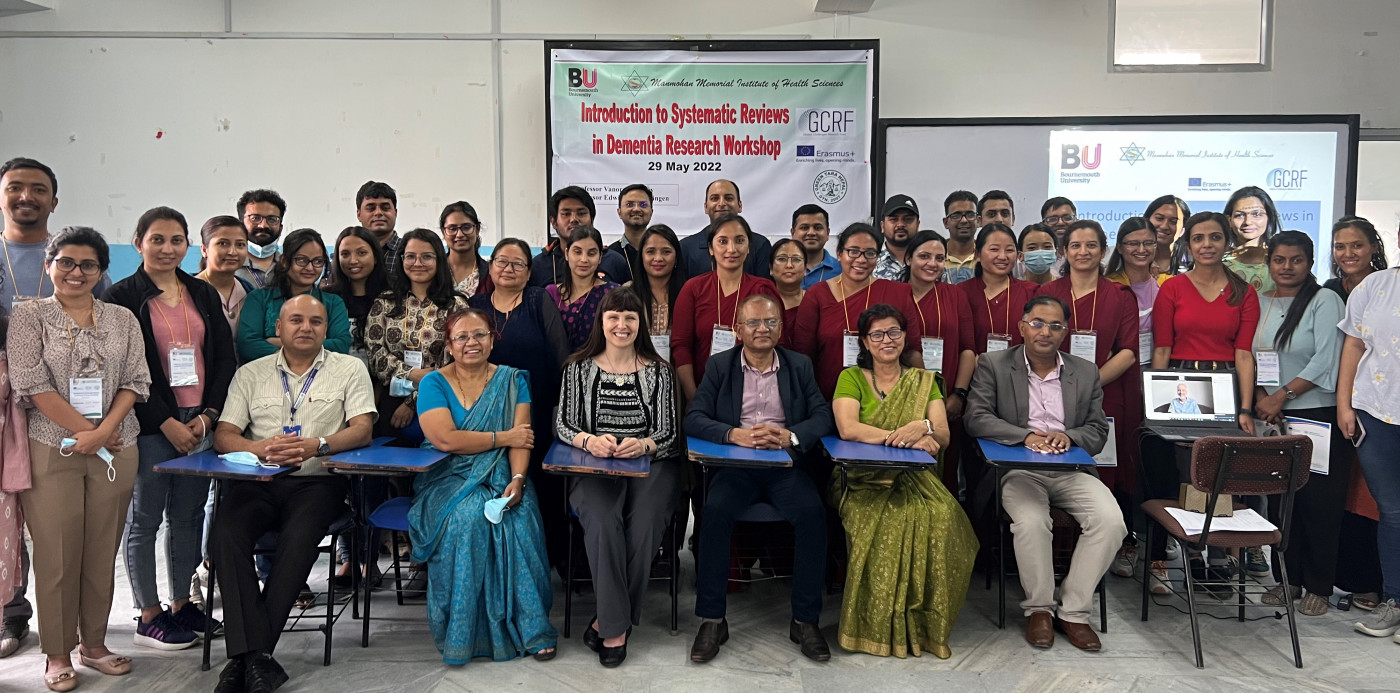 Last Sunday (29th May) Professors Vanora Hundley and Edwin van Teijlingen from the Centre for Midwifery, Maternal & Perinatal Health (CMMPH) run a hugely successful introduction to research workshop in Kathmandu. Their Global Challenges Research Fund (GCRF) funded the Systematic Review on Dementia Research Workshop on Sunday, which was very well attended. They expected (and had budgeted for) 30 people to attend and in the end the audience was closer 50 people
Last Sunday (29th May) Professors Vanora Hundley and Edwin van Teijlingen from the Centre for Midwifery, Maternal & Perinatal Health (CMMPH) run a hugely successful introduction to research workshop in Kathmandu. Their Global Challenges Research Fund (GCRF) funded the Systematic Review on Dementia Research Workshop on Sunday, which was very well attended. They expected (and had budgeted for) 30 people to attend and in the end the audience was closer 50 people .
.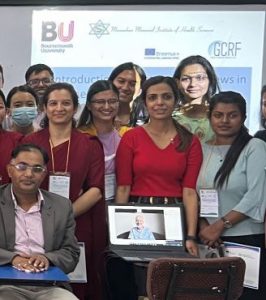 The planning nearly went wrong as two days before the workshop Prof. van Teijlingen tested positive for COVID-19 on a lateral flow test which was later confirmed by a PCR test. The fact that the event went ahead despite my quarantine in a nearby hotel room was only possible because of Prof. Vanora Hundley hard work on the day. Vanora led the workshop on the whole day whilst Edwin appeared in several sessions via ZOOM. Ironically, sitting only 200 meters away from the university venue in his hotel room. The connection was not always great, it broke up several times during the day, but it worked well enough. The MMIHS colleagues were very thoughtful when it came to the group photo at the end as they included the laptop with his ‘live’ presence on Zoom.
The planning nearly went wrong as two days before the workshop Prof. van Teijlingen tested positive for COVID-19 on a lateral flow test which was later confirmed by a PCR test. The fact that the event went ahead despite my quarantine in a nearby hotel room was only possible because of Prof. Vanora Hundley hard work on the day. Vanora led the workshop on the whole day whilst Edwin appeared in several sessions via ZOOM. Ironically, sitting only 200 meters away from the university venue in his hotel room. The connection was not always great, it broke up several times during the day, but it worked well enough. The MMIHS colleagues were very thoughtful when it came to the group photo at the end as they included the laptop with his ‘live’ presence on Zoom.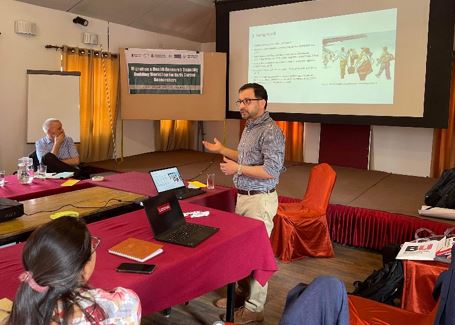
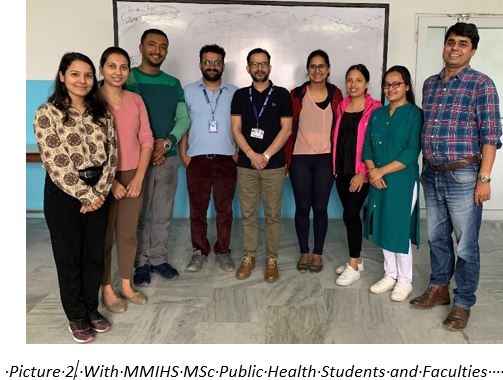
 UKRO also delivers free UK National Contact Point services for those interested in Marie Skłodowska-Curie Actions and European Research Council programmes, however some sections of UKRO website are only available to staff at subscribing organisations.
UKRO also delivers free UK National Contact Point services for those interested in Marie Skłodowska-Curie Actions and European Research Council programmes, however some sections of UKRO website are only available to staff at subscribing organisations.



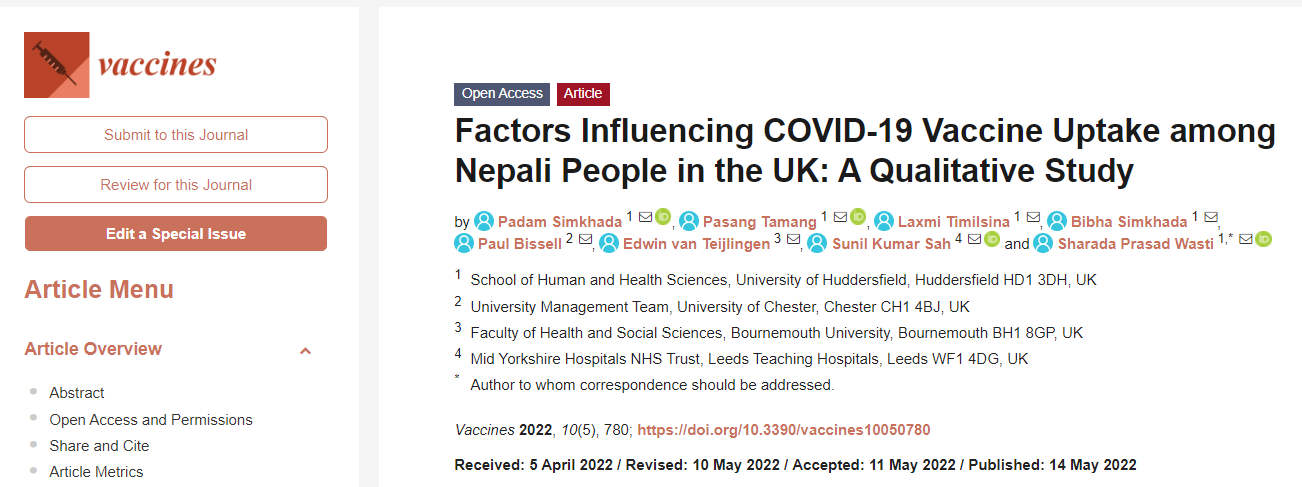


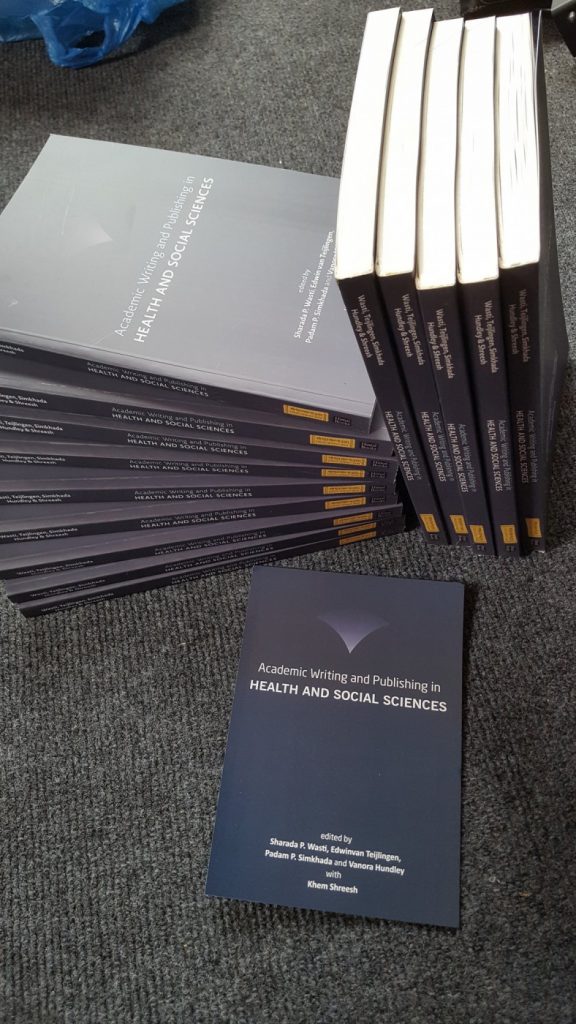
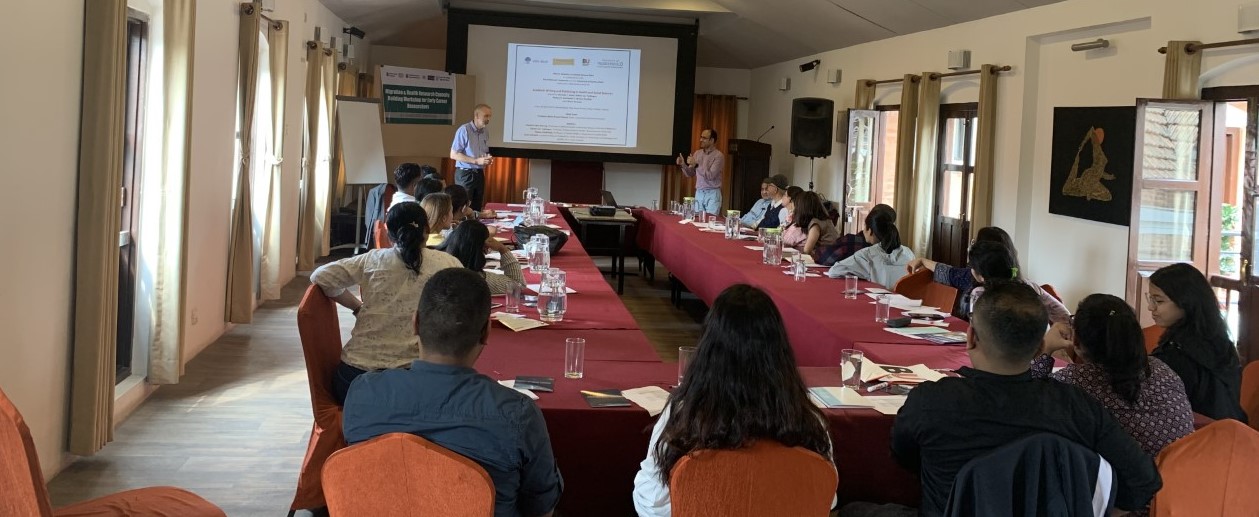

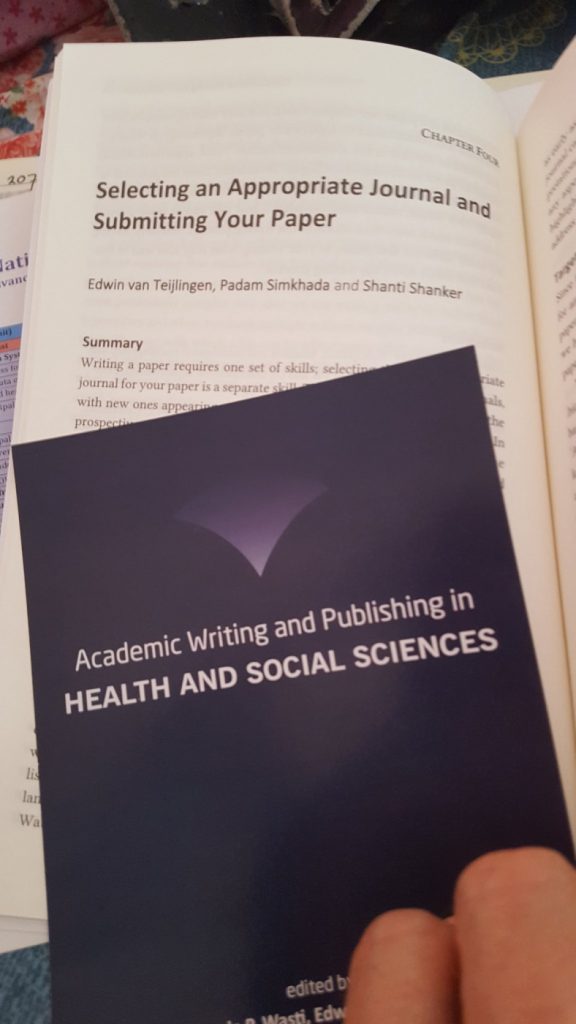
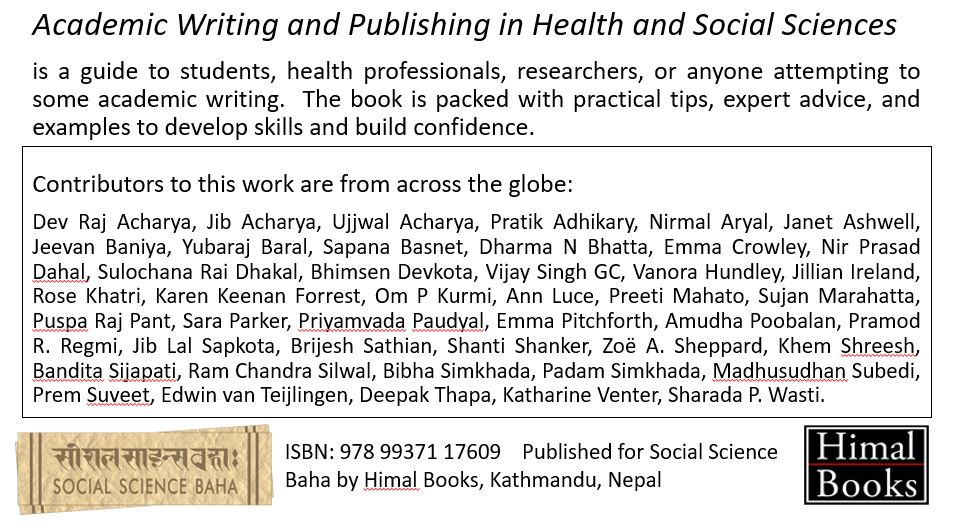
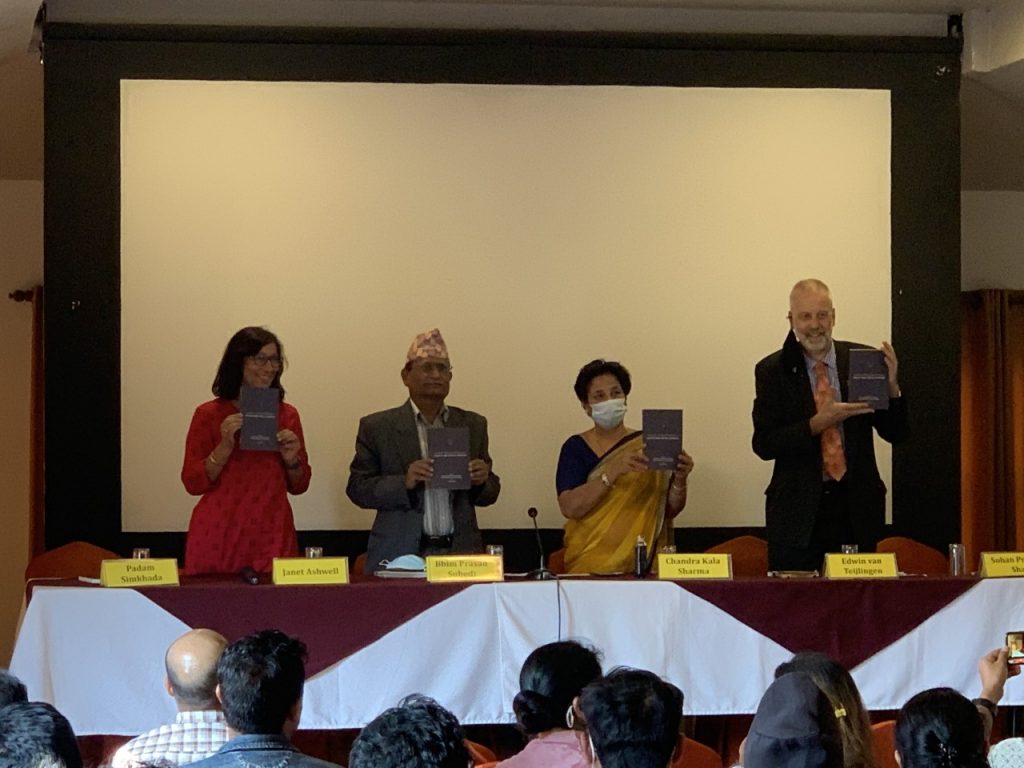
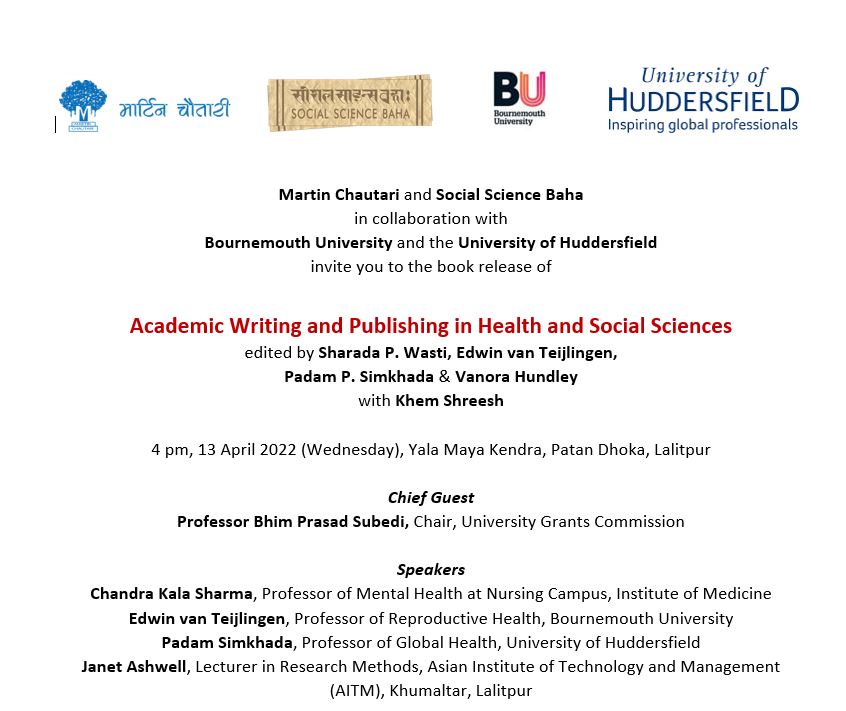


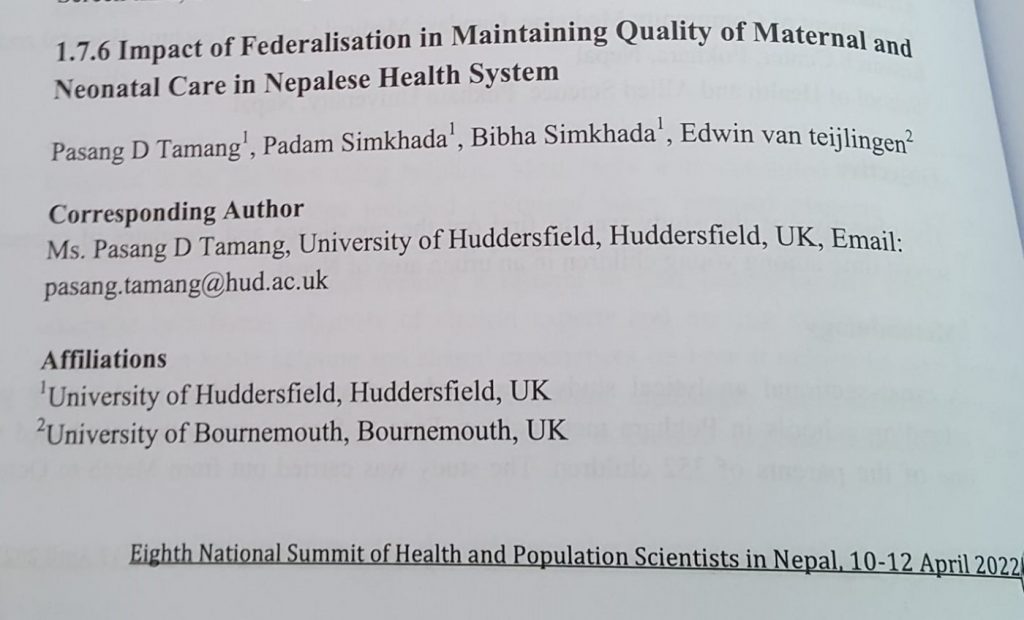
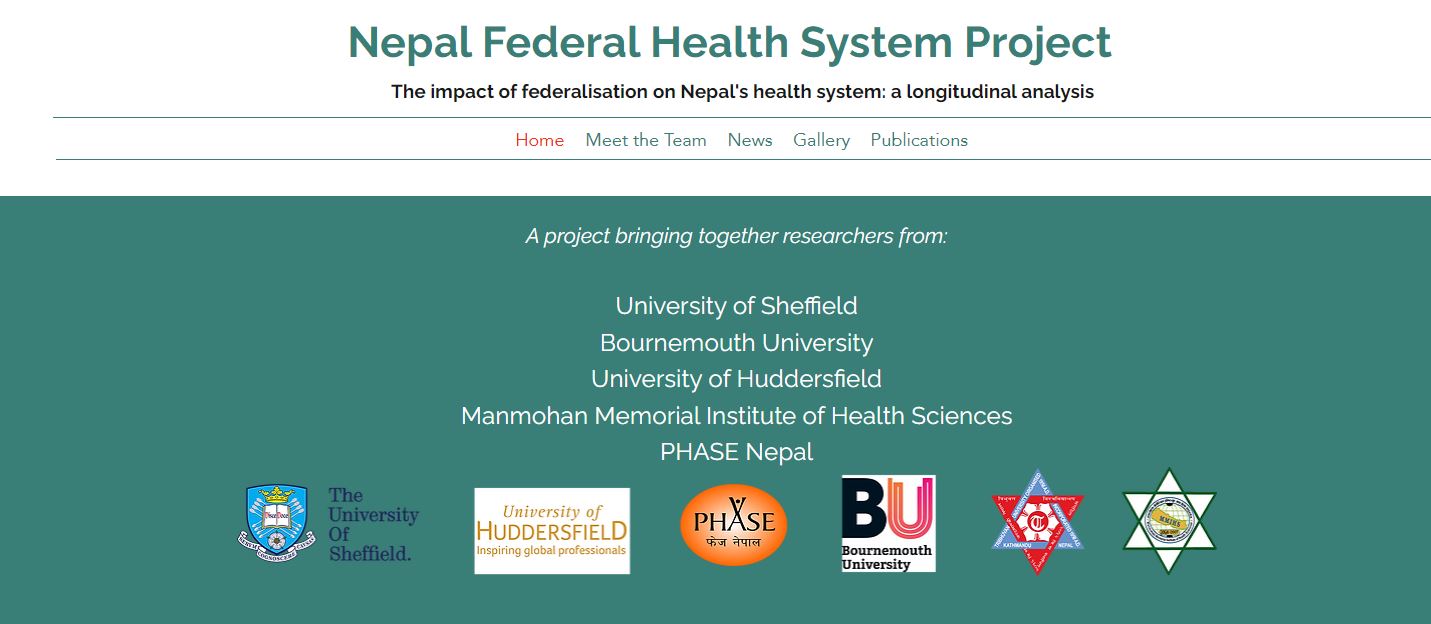



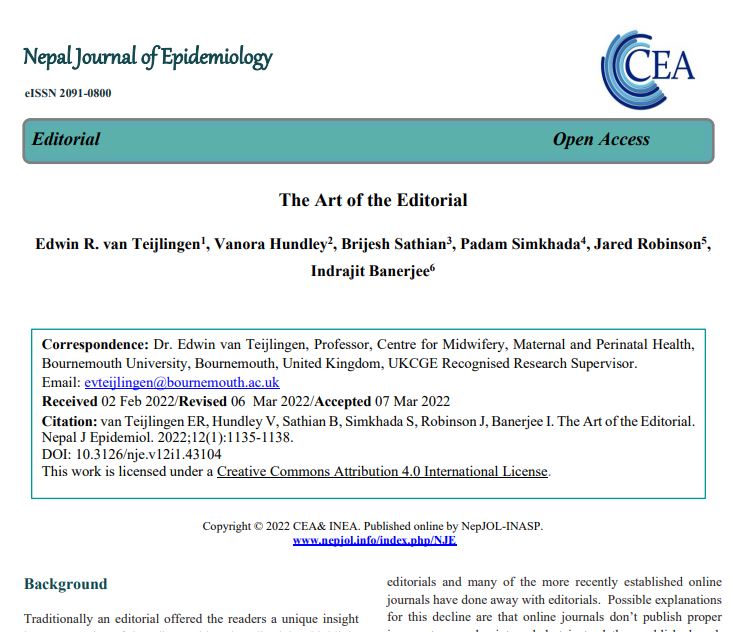


 COST Actions are typically made up of researchers from academia, SMEs, public institutions and other relevant organisations or interested parties. It is open to all science and technology fields, including new and emerging fields. COST Actions offer an inclusive, pan-European environment for individuals of all levels of seniority.
COST Actions are typically made up of researchers from academia, SMEs, public institutions and other relevant organisations or interested parties. It is open to all science and technology fields, including new and emerging fields. COST Actions offer an inclusive, pan-European environment for individuals of all levels of seniority. BU may not be in a position to lead large multi-national consortia, however BU academics may be invited to join a proposal led by another institution.
BU may not be in a position to lead large multi-national consortia, however BU academics may be invited to join a proposal led by another institution.










 New CMWH paper on maternity care
New CMWH paper on maternity care From Sustainable Research to Sustainable Research Lives: Reflections from the SPROUT Network Event
From Sustainable Research to Sustainable Research Lives: Reflections from the SPROUT Network Event ECR Funding Open Call: Research Culture & Community Grant – Apply now
ECR Funding Open Call: Research Culture & Community Grant – Apply now ECR Funding Open Call: Research Culture & Community Grant – Application Deadline Friday 12 December
ECR Funding Open Call: Research Culture & Community Grant – Application Deadline Friday 12 December MSCA Postdoctoral Fellowships 2025 Call
MSCA Postdoctoral Fellowships 2025 Call ERC Advanced Grant 2025 Webinar
ERC Advanced Grant 2025 Webinar Update on UKRO services
Update on UKRO services European research project exploring use of ‘virtual twins’ to better manage metabolic associated fatty liver disease
European research project exploring use of ‘virtual twins’ to better manage metabolic associated fatty liver disease